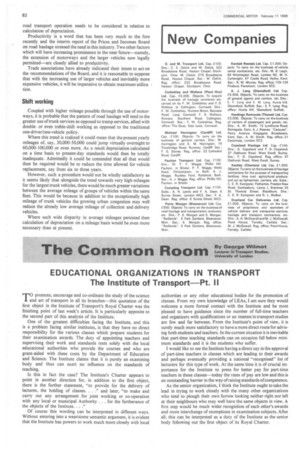EDUCATIONAL ORGANIZATIONS IN TRANSPORT The Institute of Transport—Pt. II
Page 84

If you've noticed an error in this article please click here to report it so we can fix it.
By George
University of London
To promote, encourage and co-ordinate the study of the science and art of transport in all its branches—this quotation of the first object in the Institute of Transport's Royal Charter was the finishing point of last week's article. It is particularly apposite to the second part of this, analysis of the Institute.
One of the greatest difficulties facing the Institute, and this is a problem facing similar institutes, is that they have no direct responsibility for the various classes which prepare students for their examination awards. The duty of appointing teachers and supervising their work and standards rests solely with the local educational authorities who provide the courses and who are grant-aided with these costs by the Department of Education and Science. The Institute claims that it is purely an examining body and thus can exert no influence on the standards of teaching.
Is this in fact the case? The Institute's Charter appears to point in another direction for, in addition to the first object, there is the further statement, "to provide for the delivery of lectures, the holding of classes. . . ." and later, "to make and carry out any arrangement for joint working or co-operation with any local or municipal Authority. . . for the furtherance of the objects of the Institute. .
Of course this wording can be interpreted in different ways. Without entering into a wearisome semantic argument, it is evident that the Institute has powers to work much more closely with local authorities or any other educational bodies for the promotion of classes. From my own knowledge of LEAs; I am sure they would welcome a more formal contact with the Institute and be most pleased to have guidance since the number of full-time teachers and organizers with qualifications or an interest in transport studies are few and far between. From the Institute's point of view, it is surely much more satisfactory to have a more direct route for advising both students and teachers. In the current situation it is inevitable that part-time teaching standards can on occasion fall below minimum standards and it is the students who suffer.
I would like to see the Institute having a direct say in the approval of part-time teachers in classes which are leading to their awards and perhaps eventually providing a national "recognised" list of lecturers for this type of work. At the same time it is of crucial importance for the Institute to press for better pay for part-time teachers in these classes—today the rates of pay are low and this is an outstanding barrier in the way of raising standards of competence.
As the senior organization, I think the Institute ought to take the lead in trying to work closely with the many other organizations who tend to plough their own furrow looking neither right nor left at their neighbours who may well have the same objects in view. A first step would be much wider recognition of each other's awards and more interchange of exemptions in examination subjects. After all, this can be interpreted as a duty of the Institute as the senior body following out the first object of its Royal Charter.




























































































































